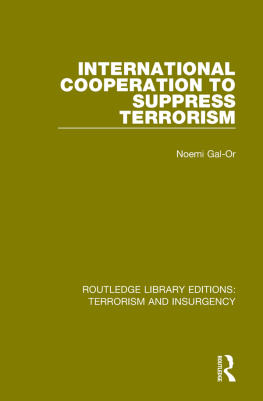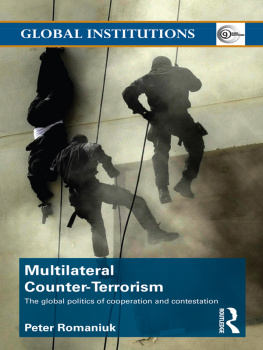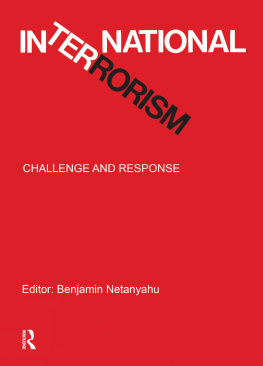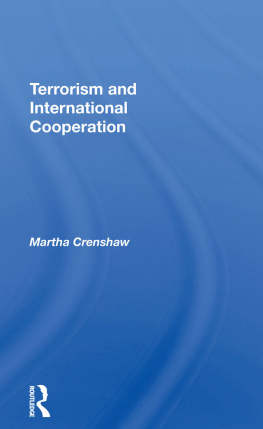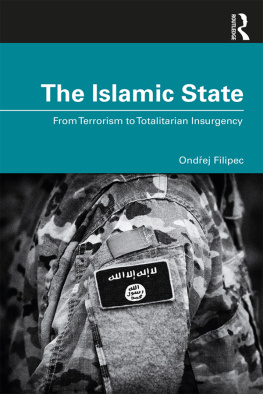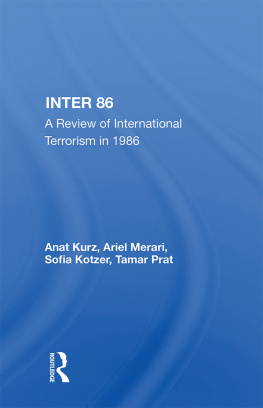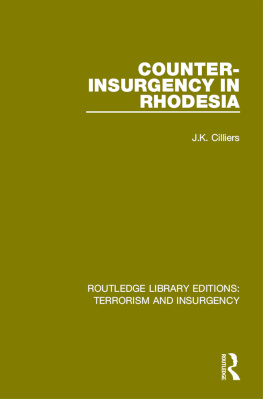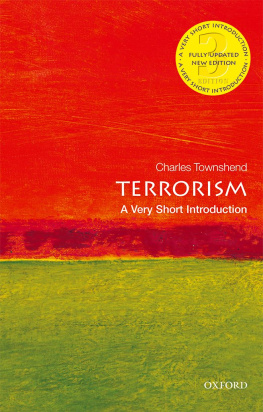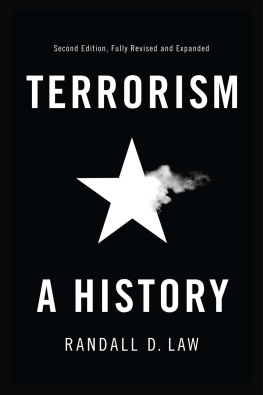ROUTLEDGE LIBRARY EDITIONS: TERRORISM AND INSURGENCY
Volume 10
INTERNATIONAL COOPERATION TO SUPPRESS TERRORISM
INTERNATIONAL COOPERATION TO SUPPRESS TERRORISM
NOEMI GAL-OR
First published 1985
This edition first published in 2015
by Routledge
2 Park Square, Milton Park, Abingdon, Oxon OX14 4RN
and by Routledge
711 Third Avenue, New York, NY 10017
Routledge is an imprint of the Taylor & Francis Group, an informa business
1985 Noemi GalOr
All rights reserved. No part of this book may be reprinted or reproduced or utilised in any form or by any electronic, mechanical, or other means, now known or hereafter invented, including photocopying and recording, or in any information storage or retrieval system, without permission in writing from the publishers.
Trademark notice: Product or corporate names may be trademarks or registered trademarks, and are used only for identification and explanation without intent to infringe.
British Library Cataloguing in Publication Data
A catalogue record for this book is available from the British Library
ISBN: 978-1-138-83955-7 (Set)
eISBN: 978-1-315-69683-6 (Set)
ISBN: 978-1-138-90481-1 (Volume 10)
eISBN: 978-1-315-69580-8 (Volume 10)
Pb ISBN: 978-1-138-90483-5 (Volume 10)
Publishers Note
The publisher has gone to great lengths to ensure the quality of this reprint but points out that some imperfections in the original copies may be apparent.
Disclaimer
The publisher has made every effort to trace copyright holders and would welcome correspondence from those they have been unable to trace.
INTERNATIONAL COOPERATION TO SUPPRESS TERRORISM
NOEMI GAL-OR
1985 Noemi GalOr
Croom Helm Ltd, Provident House, Burrell Row,
Beckenham, Kent BR3 1AT
Croom Helm Australia Pty Ltd, Suite 4, 6th Floor,
6476 Kippax Street, Surry Hills, NSW 2010, Australia
British Library Cataloguing in Publication Data
Gal-Or, Noemi
International cooperation to suppress terrorism.
1. TerrorismInternational cooperation
2. TerrorismPrevention
I. Title
363.3HV6431
ISBN 0-7099-3813-6
To Etan and my Parents
Printed and bound in Great Britain
| A.F.D.I. | = | Annuaire franais de droit international |
| AI | = | Amnesty International |
| A.J.I.L. | = | American Journal of International Law |
| A.P.S.R. | = | American Political Science Review |
| A.S.I.L. | = | American Society of International Law |
| BAZ | = | Basler Zeitung |
| CE | = | Council of Europe |
| CM | = | Committee of Ministers |
| CPSD | = | Convention on Peaceful Settlement of Disputes |
| CST | = | Cooperation in the Suppression of Terrorism |
| DMP | = | Decision-Making-Process |
| ECST | = | European Convention on the Suppression of Terrorism |
| EEC | = | European Economic Communities |
| EXC | = | European Extradition Convention |
| FAZ | = | Frankfurter Allegemeine Zeitung |
| HMSO | = | His (Her) Majestys Stationery Office |
| ICAO | = | International Civil Aviation Organization |
| ICST | = | International Cooperation in the Suppression of Terrorism |
| IISS | = | The International Institute for Strategic Studies (London) |
| MACM | = | Mutual Assistance in Criminal Matters (Convention) |
| NZZ | = | Neue Zrcher Zeitung |
| PA | = | Parliamentary Assembly |
| PHRFF | = | Protection of Human Rights and Fundamental Freedoms |
| PUP | = | Princeton University Press |
| R.D.I.L.C. | = | Revue de droit international et de lgislation compare |
| R.D.I. | = | Revue de droit international |
| R.I.D.C. | = | Revue internationale de droit compar |
| R.I.D.P. | = | Revue internationale de droit penal |
| UN | = | United Nations |
| UNTS | = | United Nations Treaty Series |
| YBILC | = | Yearbook of the International Law Commission |
| YUP | = | Yale University Press |
ACKNOWLEDGMENTS
I should like to express my gratitude to the Council of Europe for having granted me a scholarship as well as to the Swiss Confederation and the Institut Universitaire de Hautes Etudes Internationales for their financial support. I acknowledge my indebtedness to my teachers Professor Jean Siotis and Professor Lucius Caflisch from the Institut Universitaire de Hautes Etudes Internationales, Geneva, for their guidance in the preparation of this dissertation. Also Mrs. Mattaj from the Basle University Library, Mrs. Ehrsam, the typist of manuscript and Mile. Vallon from the Institut Universitaire de Hautes Etudes Internationales deserve words of thanks for their reliable assistance.
N.G.
NofYam, Israel
Numerous definitions of terrorism exist, yet none of them is satisfactory. Bearing in mind the complexity of this phenomenon and the variety of its forms, we believe it is impossible to provide a single definition acceptable to all. Instead, the definition of terrorism depends very much on subjective judgement. This is also reflected in the discrepancy between the different national legislations concerning this concept, weighing heavily on international cooperation in the suppression of terrorism.1) Brian Jenkins2) is correct in stating that:
What is called terrorism thus seems to depend on the point of view. () At some point in this expanding use of the term, terrorism can mean just what those who use the term (not the terrorists) want it to mean almost any violent act by any opponent.
The act of political terrorism (referred to in the literature also as individual or group terrorism), as distinguished from State terror, is the subject of our work.3) Identifying the actor of terrorism is therefore the initial premise.
Individual terrorism is terrorism committed by private persons, either individually or in organized groups, which aims at terrorizing a specific class of the population, a given nation or any human being, for the purpose of striking at an established regime, against a certain State or at the idea of the State. The direct victim of individual terrorism, in its most extreme form, is the individual person, but may also be representative objects such as embassy buildings, public monuments, banks, nuclear installations, airline agencies, etc. The final target is always the State.
On the other hand, State terror (not discussed in this study) is directed by those in power and carried out by State organs against a certain population (which may include a minority, all the citizens of that State, or the population of an occupied State). It terrorizes the people to enforce their obedience to the regime and strengthen its power and authority over them. State terror strikes directly at the individual as well, although with a purpose opposite to that of individual terrorism. Both kinds of inspiring terror have totally different characteristics, effects and repercussions. Consequently, they must be studied separately.4)

